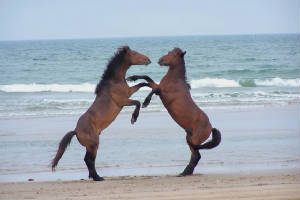Corolla Wild Horses
When the English settlers landed at Jamestown in 1607, they were not the only descendants of Europeans in the New World. Spanish explorers had been in the Gulf Coast and Florida for nearly 100 years. A generation before the landing at Jamestown, Spanish explorers established an outpost on the York River in eastern Virginia. The Spanish were not pedestrians. Many came mounted on the best horses of Europe. Since that time, the descendants of these beautiful horses have roamed wild on the Outer Banks of North Carolina. In the 1920s, as many as 6,000 Spanish mustangs covered the beaches and dunes of the sparsely inhabited region. Today, fewer than 125 roam free near Corolla-with another band roaming free at Shackleford Banks, over 150 miles to the south. The wild horses of Corolla are protected by the Corolla Wild Horse Fund.
Since that time, the descendants of these beautiful horses have roamed wild on the Outer Banks of North Carolina. In the 1920s, as many as 6,000 Spanish mustangs covered the beaches and dunes of the sparsely inhabited region. Today, fewer than 125 roam free near Corolla-with another band roaming free at Shackleford Banks, over 150 miles to the south. The wild horses of Corolla are protected by the Corolla Wild Horse Fund.At Mill Swamp Indian Horses, we are spearheading an effort to keep America’s oldest distinct breed of horses from going extinct.
We are actively encouraging the adoption of these docile, highly-trainable horses, and are further seeking out breeders who would be willing to participate in a breeding program to save these horses. For further information please send Steve an e-mail: msindianhorses@aol.com. Read More About This Dying Breed
To visit the Corolla Wild Horse Fund Website Click Here
Breed Registries
Horses of the America's RegistryCorolla and Shackleford Inspection Report
American Indian Horse Registry
Lido Fund

My youngest brother Patrick Elido, died December 29, 2008, in a hunting accident at age 17. Lido was born with cerebral palsy. Although his right arm was of little use to him, and his right leg was not much stronger, for several years, Lido was the first person to mount each of the wild horses and colts that I started. One day when he was about ten years old, he mounted five horses that had never been mounted and only got bucked off of one of them. Cerebral palsy made everything that he did difficult, and his spirit made everything that he did possible. He ran hard, trained hard and worked hard to build a rock-hard, lean body. His left arm carried the strength of most grown men's entire upper bodies, and he could run five miles faster than most teens he attended school with. He also understood that the essence of natural horsemanship was to simply communicate with a horse in a language that the horse understood. He knew how to handle a scared horse with only his eyes, and a mean horse with only a rope halter. His ability convinced me that it was possible to teach natural horsemanship to kids to the degree that they could actually start and train their own colts with proper supervision and instruction. During the first few years that I conducted training clinics and demonstrations, Lido was my only assistant. During one of my clinics with a particularly rough BLM mare who gave me great difficulty in saddling, I heard a voice coming out of the audience as I explained that I would not be mounting her for the clinic. "Um ah bolunteer," Lido called out. Lido's speech was as labored by cerebral palsy as much of his movement. Lido was the toughest ranch hand that I will ever know. He had guts. He loved animals and people. And when he rode, he rode hard. He treated those around him with good-natured kind-heartedness.
The Horse of the Americas Registry has honored Lido by establishing and administering a fund in his name to assist in the rescue of individual endangered Colonial Spanish Horses.
Contributions can be made to the Lido Fund--HOA Registry, and mailed to:
